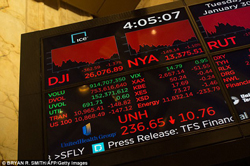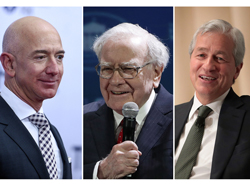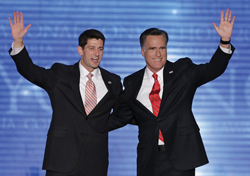The CEOs of Amazon, JPMorgan, and Berkshire Hathaway proposed a healthcare plan which they believe will lower costs for their employees last Tuesday, Jan. 30.
The three said that they wish to start “an independent company that is free from profit-making incentives and constraints.” Instead, they explain that they will be focusing on technological solutions in order to provide their employees with “simplified, high-quality and transparent healthcare at a reasonable cost.”
“The health care system is complex, and we enter into this challenge open-eyed about the degree of difficulty,” said Bezos.
“Hard as it might be, reducing health care’s burden on the economy while improving outcomes for employees and their families would be worth the effort.”
“Being in a healthcare industry, I find many people to be uneducated well enough about their healthcare benefits,” said Polina Amburg, specialist professor in the Department of Nursing.
“Employers looking to save money don’t always offer the best healthcare plans for their employees, she explained. “The cost of services, such as co-pays and deductible, often prevent people from seeking adequate and timely medical care. There is a great need for an affordable quality healthcare services.”
 Amburg believes that the idea of some of the major companies creating a new healthcare industry is “excellent.”
Amburg believes that the idea of some of the major companies creating a new healthcare industry is “excellent.”
However, she explains that it is not easy to measure the success of the proposition. “More information on details of the new healthcare plan proposal is needed to estimate its efficiency,” she said.
Recent analysis of health care spending in the employer market found that prices are still soaring even though workers are using the same, or even fewer, services.
Moreover, total spending per person rose 15 percent between 2012 and 2016, according to the Health Care Cost Institute.
Additionally, price hikes for prescription drugs and inpatient services fueled the increase, jumping nearly 25 percent and 24.3 percent respectively.
“Amazon, JP Morgan and Berkshire Hathaway attempting to provide healthcare to their combined workforce of 1.8 million is worth watching,” Ken Mitchell, Ph.D., Chair of the Department of Political Science and Sociology, and associate professor of political science said.
“It came out of nowhere, catching Wall Street, D.C., and industry observers off-guard.”
Mitchell explains how, because members of Congress are beholden to their donors and bases, healthcare in the United States is a difficult legislation to pass politically.
“First, Democrats and Republicans exhibit shocking yet consistent incompetence in the area of healthcare,” he said.
“Warren Buffet is correct, it is ‘the tapeworm in America’s intestines,’” Mitchell noted.
Additionally, Mitchell addressed the statistics which show that Americans pay far more for healthcare, than other countries do, yet receive far less in benefits and treatments for the higher price.
“Democrats prioritize Big Pharma and Big Insurance donors,” while neglecting the needs of the constituents whom they represent and serve, Mitchell explained.
“Republicans peddle ‘end of days’ Orwellian nonsense,” he said, referring to the GOP’s disparagement of government intervention in healthcare, labeling it as socialized medicine. “In short, political dysfunction, corruption and immorality open up opportunities for other actors,” Mitchell says.
Neil Trautwein, vice president at the National Retail Federation trade group, who lobbies Congress on healthcare issues, told the Los Angeles Times that the new venture won’t affect the torrid debates over healthcare already happening in Washington,
However, he explains, it could adjust the dynamics over the issue if the companies come up with completive innovative ideas.
“Imagine a world where, much the same as we might shop on Amazon’s site, we have information on physicians, how much he or she charges,” Trautwein said. “If you can make healthcare that easy, then you can squeeze a lot of unnecessary cost out of the system.”
In response to the trio’s proposal, stocks in drug- and health-insurance have plummeted, even though they have not disclosed details of their plan.
Investors guess that the initiative will eventually stifle sales growth and profit for others in the healthcare field.
Top insurer UnitedHealth fell three percent, which attributed to the more than 300 point drop in the Dow.
Likewise, other insurers like Cigna and Anthem dropped more than five percent—and CVS and Walgreens both declined more than four percent.
Another aspect Mitchell address is that “corporate competition for talent is intense.” “I hear about this on my regular trips to Silicon Valley,” he said.
“Amazon competes with Google [and] Apple… and JP Morgan competes with Goldman [and] hedge funds… for the best talent,” Mitchell explained.
“Salaries go further when they are not eaten up by healthcare costs. Amazon makes its money by cutting out ‘intermediaries’ and healthcare is larded with such actors, all of which donate to the political parties. Let’s hope Amazon and partners succeed.”
Gary Cohn, President Trump’s top economic advisor, told CNBC that the joint efforts by Amazon, Berkshire Hathaway, and JPMorgan is the same as what the Trump Administration did last October.
Through the president’s executive order, the administration aimed to allow small businesses to buy group insurance policies.
However, those efforts affected only small businesses; unlike the proposal set forth by the three CEO’s.
Buffet’s Berkshire Hathaway, which owns the auto insurer Geico, is a major player in the insurance and re-insurance business. However, it doesn’t currently offer health insurance.
“[Bezos, Dimon, and I] share the belief that putting our collective resources behind the country’s best talent can, in time, check the rise in health costs while concurrently enhancing patient satisfaction and outcomes,” Buffet told CNN in an interview.
“This is an exciting development that seems likely to lower health care costs,” Chris Hirschler, Chair of the Department of Health and Physical Education and associate professor of health, said.
Moreover, Hirschler explained that “given Warren Buffet’s involvement and his philanthropic pledges, [such as to] give away about 99% of his wealth.”
“I’m hopeful that his moral compass will guide their efforts and translate to better, less expensive, and more accessible health care,” Hirschler said.
IMAGES TAKEN from Politifacts



